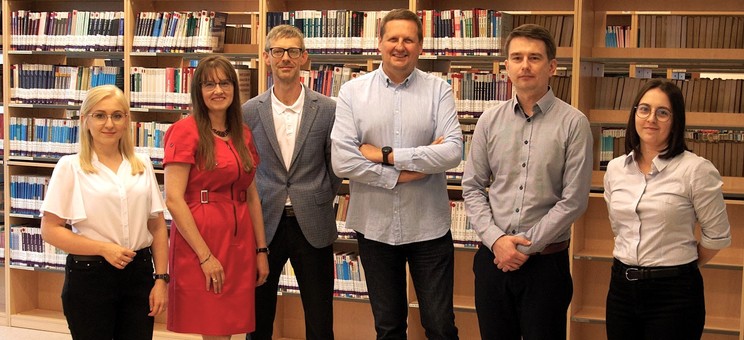Naukowcy WBMiL realizują projekt „Promoting Accountable and Transparent Human-centered AI in Higher Education – PATH-AI”

Projekt międzynarodowy „Promoting Accountable and Transparent Human-centered AI in Higher Education – PATH-AI” (2025-1-PL01-KA220-HED-000359600) zajął 1. miejsce w konkursie wniosków złożonych w ramach AKCJI 2 Partnerstwa na rzecz współpracy, Partnerstwa współpracy w ramach sektora Szkolnictwo wyższe w programie Erasmus+ (KA220-HED) i uzyskał dofinansowanie ze środków Unii Europejskiej. Projekt będzie realizowany przez zespół pracowników Wydziału Budowy Maszyn i Lotnictwa, w którego skład wchodzą: koordynator projektu dr hab. inż. Paweł Litwin, prof. PRz, dr hab. inż. Dorota Stadnicka, prof. PRz, dr inż. Łukasz Paśko, dr inż. Marcin Olech, mgr inż. Jolanta Litwin i mgr inż. Anna Szymusik-Szpara.
Projekt ma na celu wykorzystanie transformacyjnej mocy i korzyści, jakie oferuje generatywna sztuczna inteligencja (AI) w szkolnictwie wyższym. Obejmuje przygotowanie strategii włączania AI do szkolnictwa wyższego oraz opracowanie pilotażowych przedmiotów i szkoleń. Szczególną uwagę położono na użytkowanie sztucznej inteligencji zgodnie z istniejącymi normami prawnymi i etycznymi oraz odpowiedzialną integrację. Zakładanym głównym rezultatem projektu jest poprawa jakości kształcenia, wzrost zaangażowania studentów i lepsze dostosowanie do oczekiwań wobec przyszłych pracowników. Projekt będzie realizowany od września 2025r. do sierpnia 2028r. Liderem konsorcjum projektu jest Politechnika Rzeszowska a partnerami są: Królewski Instytut Technologiczny w Sztokholmie, Uniwersytet Bergamo, Uniwersytet Maltański, Politechnika w Turynie, Uniwersytet w Lublanie oraz Uniwersytet w Rijece.
The international project “Promoting Accountable and Transparent Human-centered AI in Higher Education – PATH-AI” (2025-1-PL01-KA220-HED-000359600) won first place in the call for proposals submitted under ACTION 2 Partnerships for Cooperation, Cooperation Partnerships in the Higher Education sector of the Erasmus+ program (KA220-HED) and received funding from the European Union. The project aims to harness the transformative power and benefits of generative artificial intelligence (AI) in higher education. The project involves the development of a strategy for integrating AI into higher education and the implementation of pilot courses and training programs.
Particular attention is paid to the use of artificial intelligence in agreement with existing legal and ethical standards and its responsible integration. The main outcome of the project is to improve the quality of education, increase student engagement, and better align with theexpectations for future employees. The project will be run from September 2025 to August 2028. The project consortium is led by the Rzeszów University of Technology, and the partners are: the Royal Institute of Technology in Stockholm, the University of Bergamo, the University of Malta, the Turin Technical University, the University of Ljubljana, and the University of Rijeka. The project team members include staff from the Faculty of Mechanical Engineering and Aviation at the Rzeszów University of Technology: Dr. Paweł Litwin, professor at the university and project coordinator, and contractors: Dr. Dorota Stadnicka, professor at the university, Dr. Łukasz Paśko, Dr. Marcin Olech, Jolanta Litwin, M.Sc., Eng., and Anna Szymusik-Szpara, M.Sc., Eng.








